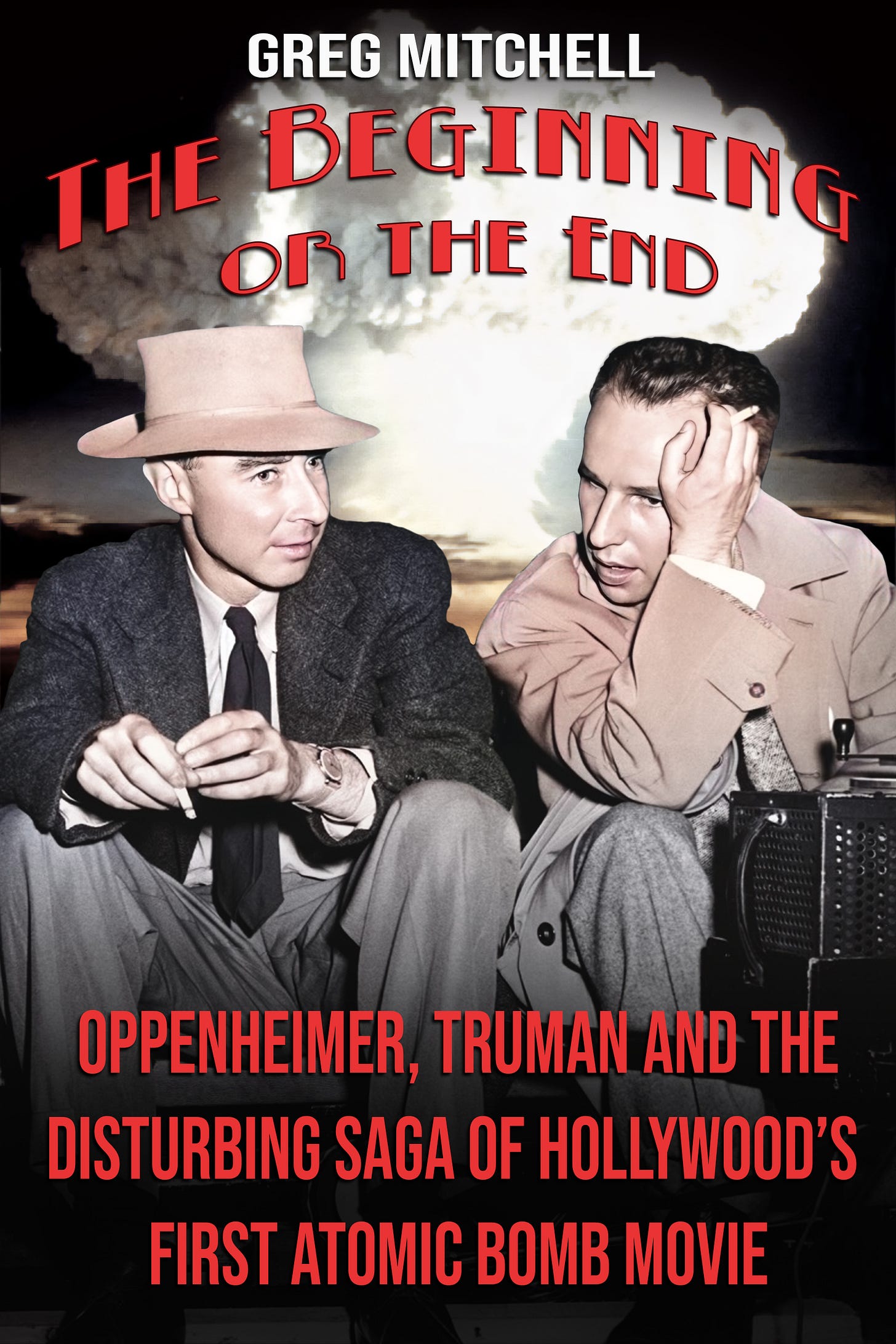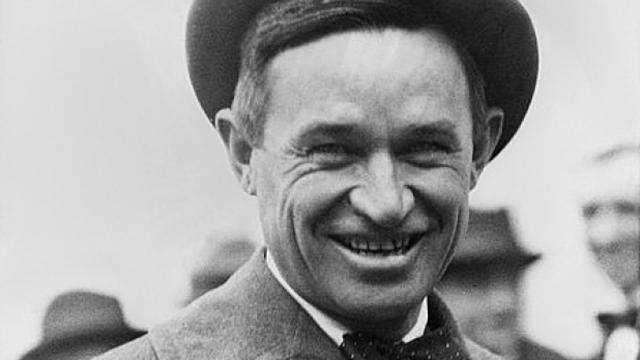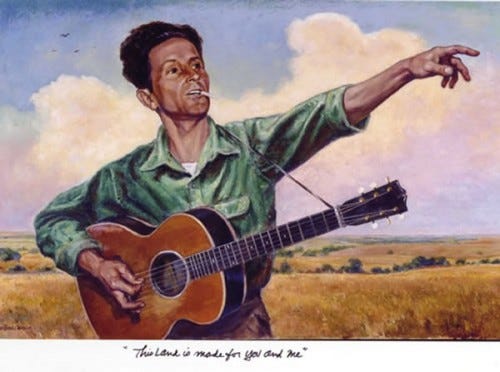For July 4: Will Rogers & Woody Guthrie, Two Great Americans
Plus songs from Wilco, Bob Dylan, Rosanne Cash, U2, Pete Seeger, Bruce Springsteen, Ry Cooder and more.
A holiday special today featuring two of the greatest, and most politically influential, Americans ever, Will Rogers and Woody Guthrie. Enjoy, then subscribe—it’s still free but I need to be encouraged to keep this going!
Finally, highly relevant as we await the upcoming Christopher Nolan Oppenheimer movie— my award-winning 2020 book, The Beginning or the End, in which the “Father of the Atomic Bomb” plays a pivotal, and rather disgraceful, part. Here is more, and here is where you can order the book.
Now, moving on: Years ago, Wilco’s Jeff Tweedy in Grammy-winning Mermaid Avenue album, with Billy Bragg, took old lyrics by Woody and turned them into splendid new tunes, such as my favorite, “California Stars,” here with my man Jason Isbell (who has a new album just out this month) on hot guitar.
The ‘Cherokee Kid’
One of the most tragic accidents of the century occurred in 1935 when a light plane helmed by famed pilot Wiley Post crashed in Alaska, killing him and the man often described as the most popular American of his time (possibly even including President Franklin D. Roosevelt). The phrase "nation mourned" is often tossed about carelessly, but in this case it was true. Historians claim it was the greatest outpouring of genuine affection since Lincoln was assassinated. NBC and CBS radio went off the air for thirty minutes in mourning and movie theaters all over the country darkened their screens.
In the wreckage of the plane was found in Will Rogers' typewriter a sheet of paper with the beginning of one last column: "Now I must get back to advising my Democrats." Earlier he proposed as his epitaph: Here lies Will Rogers. Politicians turned honest, and he starved to death.
Back in 1933, however, in the depths of the Depression, when an eternally hopeful Democrat was about to take the reins from a widely-hated failure, Rogers commented, "A smile in the White House again, why, it will look like a meal to us." He might have said the same of the transition to Joe Biden earlier this year.
Imagine this: Rogers was by then the country's most popular radio personality and newspaper columnist and number one male movie star. Unfortunately, many Americans today think of Rogers (if they know him at all) as merely a folksy humorist or even a rope-twirling vaudeville star, thanks to the Broadway hit, The Will Rogers Follies. Of course he was all of that but in addition he was also the nation's wisest and most influential political commentator.
He was, in short, the Will of the People.
His views on Republicans, on Wall Street and big banks, on income inequality, and the need for FDR to take bold action, are particularly relevant right now. He expressly called for “more equal distribution of wealth in this country.” When Roosevelt (already influenced immensely by Rogers) was about to be inaugurated, he advised, "We have had years of 'Don't rock the boat.' Go on and sink it if you want to. We just as well be swimming as like we are.… For three years we have had nothing but 'America is fundamentally sound.' It should have been 'America is fundamentally cuckoo.'" (Below, Woody Guthrie, his fellow Oklahoman, who was just on the brink of fame in 1935, sings “Will Rogers Highway.”)
Perhaps the question most often asked in America in the final decade of his life was: Did you see what Will Rogers said? He was the forerunner of late night TV hosts with their topical monologues. Some of his wisecracks have turned to cliche ("All I know is what I read in the papers"); others entered the American language as folk sayings or punch lines:
"Every time Congress makes a joke it's a law, and every time they make a law it's a joke."
“I am not a member of any organized political party. I am a Democrat.”
"We hold the distinction of being the only nation that is goin' to the poorhouse in an automobile."
"This would be a great world to dance in if we didn't have to pay the fiddler."
Perhaps the most famous quote attributed to him, however, was actually more of a paraphrase: “I never met a man I didn’t like.” (Below, Dylan pays tribute to Woody’s classic about Dust Bowl refugees, “Do-Re-Mi.”)
Rogers was our "most complete human document... the heartbeat of America," Damon Runyon observed, although his record on race relations was mixed, not unusual for the time. Reviewing one of his books, a New York Times critic insisted that "America has never produced anybody quite like him, and there has rarely been an American humorist whose words produced less empty laughter or more sober thought." The theologian Reinhold Niebuhr praised his facility in puncturing foibles "which more pretentious teachers leave untouched."
His life was an American amalgam. He liked to brag that his ancestors did not come over on the Mayflower--they met the boat. Rogers was born in pre-Oklahoma "Indian Territory," as it was known, in 1879, and was at least one-quarter Cherokee and immensely proud of it. Although he spent most of his life on a ranch, he hated guns, possibly because of what they (and their owners) had done to Native Americans. Mention Andrew Jackson and he would really go off.
Before settling down as a political philosopher and movie star in the 1920s, Rogers worked as a cowboy. Rope tricks were his specialty, but Rogers was no bumpkin: He lived in New York City for many years while appearing with the Ziegfeld Follies before moving to Santa Monica. Unlike most commentators at the time he often traveled abroad, and not just to Europe but to hot spots in South America and the Far East, and due to his fame was able to meet with top officials and experts there. (Below, Rosanne Cash sings another Woody portrait of the dispossessed, “I Ain’t Got No Home.”)
Rogers read newspapers and magazines voraciously. He was often mentioned as a presidential candidate, and he regularly received a strong write-in vote in state and national elections. He even ran a mock campaign for president in 1928 as the candidate of the Anti-Bunk Party, and then was seriously proposed as Al Smith’s running mate by one of the top columnists, Heywoud Broun. The National Press Club appointed him America's congressman-at-large, and others called him the Unofficial President. At the Democratic National Convention in 1932 he received twenty-two votes as Oklahoma's favorite-son candidate and was so excited he slept through the balloting.
Another Oklahoman named William C. Rogers, no relation, ran for Congress in 1933 after shortening his first name to Will--and won by fifty thousand votes.
To those who complained that his humor was becoming too topical, Rogers replied, "I hope I never get so old that I can't peep behind the scenes and see the amount of politics that's mixed in the medicine before it's dished out to the people as 'pure statesmanship.'" He once compared the U.S. Senate to Siberia--the place "where they send all the rich men." And: "My idea of an honest politician is a fellow who declares income tax on the money he sold his vote for….The Democrats and the Republicans are equally corrupt where money is concerned. It’s only in the amount where the Republicans excel." (“Vigilante Man”—like Bruce Springsteen’s “Ghost of Tom Joad”—was inspired by Steinbeck’s Grapes of Wrath, below by guitar master Ry Cooder.)
During the early years of the Depression, Will Rogers voiced the despair of the average American and appeared at countless benefits, for victims of all races, to raise relief money. "What is the matter with our country anyhow?" he wondered. "With all our brains in high positions, and all our boasted organizations, thousands of our folks are starving, or on the verge of it. Why can't there be some means of at least giving everybody all the bread they wanted, anyhow?"
What many consider his most important radio address came in 1931 in a program he shared with President Hoover, which made Will’s comments even more troubling—for Hoover—especially since tens of millions were listening. One of them was the governor of New York, Franklin Roosevelt, who was mightily impressed. Rogers in his talk dismissed as distractions every issue that did not address seeing to it that “every man that wants to is able to work…and also to arrange some way of getting a more equal distribution of the wealth in this country….
So here we are in a country with more wheat and more corn and more money in the bank, more cotton, more everything in the world—there’s not a product that you can name that we haven’t got more of it than any other country ever had on the face of the earth—and yet we’ve got people starving. These people that you’re asked to aid, why they’re not asking for charity, they are naturally asking for a job, but if you can’t give ‘em a job why the next best thing you can do is see that they have food and the necessities of life.
You know, there’s not a one of us who has anything that these people that are without it now haven’t contributed to what we’ve got. I suppose the most unemployed or the hungriest man in America has contributed in one way to the wealth of every millionaire in America.
It wasn’t the working class that brought this condition on at all. It was the big boys themselves who thought that this financial drunk we were going through was going to last forever. They over-merged and over-capitalized, and over-everything else. That’s the fix we’re in now.
Soon, he was backing FDR's election, and then given partial credit for helping him achieve it. When Roosevelt was about to take office, Will sent along a list of soon-to-be-immortalized suggestions:
“Kid Congress and the Senate, don't scold 'em. They are just children that's never grown up... Keep off the radio till you got something to say... Stay off that back lawn with those photographers. Nothing will kill interest in a president quicker....If somebody gets all excited and tells you, 'Wall Street has just done a nose dive,' tell them, 'Those Republican organizations don't interest me in the least.'" (Below, U2 with a rocking version of Woody’s “Jesus Christ.”)
Roosevelt followed his advice almost to the letter. When the president declared a bank holiday, Rogers commented: "The whole country is with him... Even if he does something wrong they are with him, just so he does something... If he burned down the Capitol, we would cheer and say, 'Well, we at least got a fire started anyhow.'"
And: “Every American international banker ought to have printed on his office door, 'Alive today by the grace of a nation that has a sense of humor.'"
FDR would move forward with all sorts of New Deal programs on relief, jobs, Social Security and much more. Will Rogers was not alive to see many of the fruits of this, after he took that fateful flight across Alaska with Wiley Post in 1935. The national mourning and outpouring of affection expressed profound appreciation for Rogers helping to set much of the American recovery in motion—and for all the laughs along the way.
(Below, an all-star offering of “This Land Is Your Land” with Arlo Guthrie, Neil Young, John Prine, Willie Nelson and more. And below that, Pete Seeger and Bruce Springsteen perform the song for the Obama inaugural.)
Greg Mitchell is the author of a dozen books, including the bestseller The Tunnels, the current The Beginning or the End, and The Campaign of the Century, which was recently picked by the Wall St. Journal as one of five greatest books ever about an election. For all of the 1970s he was the #2 editor at the legendary Crawdaddy. Later he won more than a dozen awards as editor of Editor & Publisher magazine. He recently co-produced a film about Beethoven’s Ninth Symphony and now has written and directed three documentaries, including two for PBS since 2022.







If they gave a Pulitzer for caring about and celebrating the right stuff, you'd win it.
Excellent.